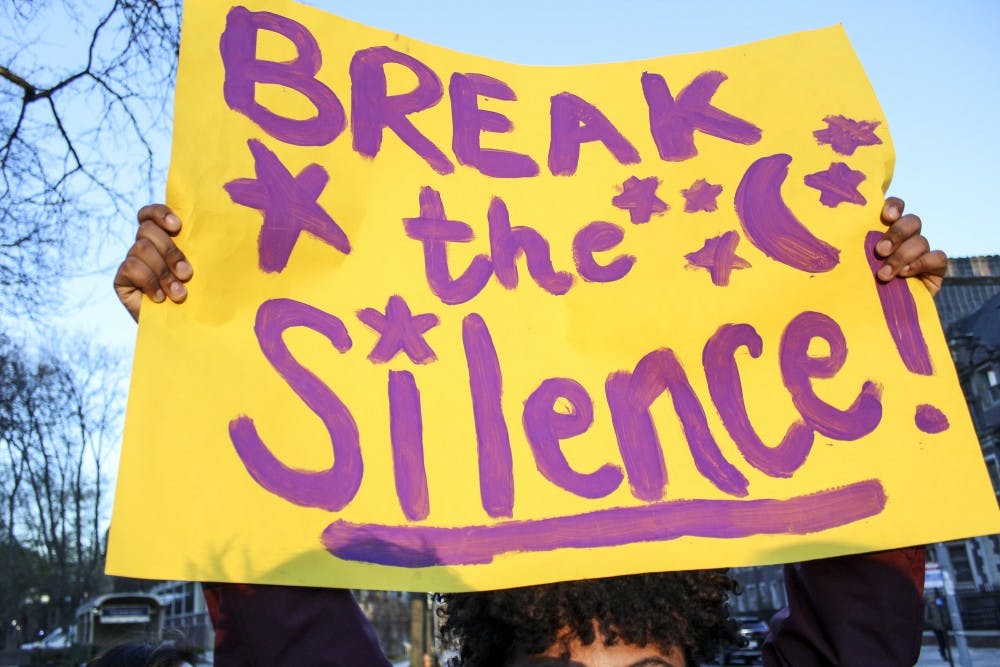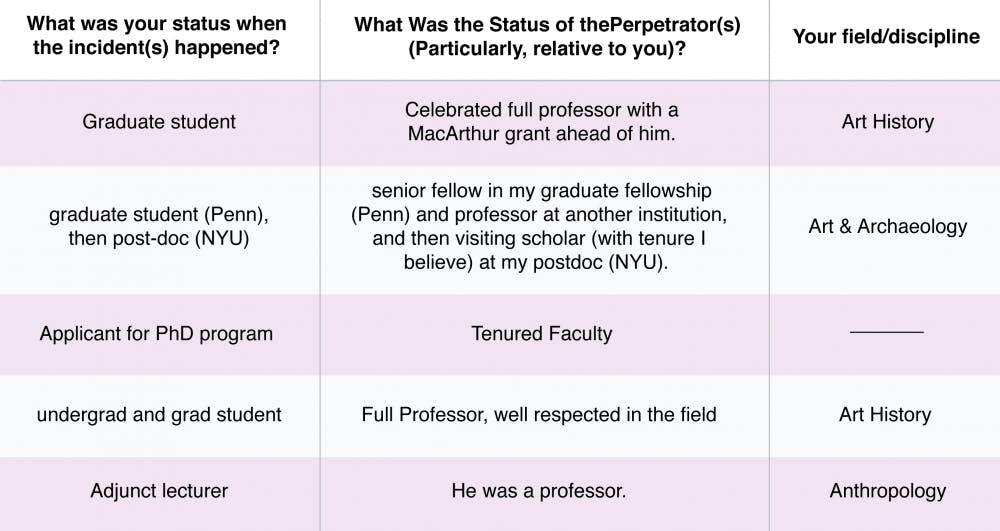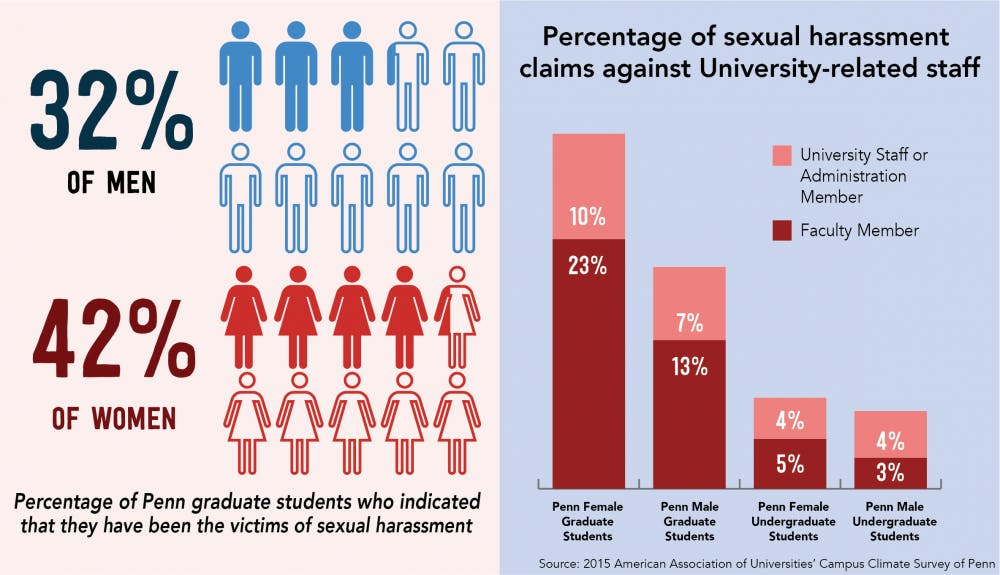
A new public survey on sexual harassment in higher education has pointed toward a range of alleged incidents at Penn. One respondent said her Penn professor hugged her and caressed her neck even when she tried to break free; another wrote that "in a sick moment, [her professor] stuck his tongue inside [her] mouth."
Karen Kelsky, a former anthropology professor at the University of Oregon and the University of Illinois at Urbana-Champaign, started this survey on Nov. 30, inviting victims of harassment to share their stories, Philly Voice reported.
As of Jan. 16, over 2,300 responses were filed in the rapidly-growing spreadsheet that calls on anonymous respondents to describe incidents of sexual harassment that they have faced within the realm of academia and higher education.
Five entries of sexual harassment allegedly were perpetrated by Penn colleagues, mentors, and faculty members. Four of the respondents were graduate students at the time of the incident, while one was an adjunct lecturer. All the respondents said their alleged harassers were male.

On Dec. 7, an adjunct lecturer described an incident with a tenured dissertation adviser who made an unwanted advance toward her. When she tried to stop the unwanted propositions by going to her superiors, she was shot down.
"[M]y (male) chair said he thought it was likely a misunderstanding and that he couldn’t protect my identity if he discussed it with the faculty member; the Dean of our division said that we could do nothing and see if the problem went away; or I could approach him, or the chair could. Not trusting my chair, I decided I had to address the harasser myself," the adjunct lecturer wrote.
“As frustrating and uncomfortable as my situation with the harasser was, the institutional response was and remains far more upsetting,” she continued. “Knowing that the University’s primary goal [is] to protect itself and [its] image rather than vulnerable women is repugnant.”
President of Graduate and Professional Student Assembly and third-year graduate student in the School of Design and School of Arts and Sciences Miles Owen said the lecturer's frustrating outreach to several different administrators is a "fairly common occurrence."
"[They] went to the Ombudsman, went to the Dean's office, went to their chair, and nobody could specifically deal with it," Owen said. "If you create such a barrier for reporting, it makes it hard to fully address the issue."
A former woman graduate student wrote that a male senior fellow in her graduate fellowship at Penn would aggressively flirt with the “newest, prettiest women” in their annual society of fellows meeting.
“I know you will hear much worse stories, but this type of sexual harassment is completely pervasive and undermines our careers,” she said.
Professor Greg Urban, the department chair of Anthropology, one of the fields mentioned in the allegations, wrote in an emailed statement that, in over a cumulative decade as department chair, he had not been made aware of sexual harassment allegations against Anthropology Department faculty. He referred to the University's Sexual Harassment Policy and added that the Anthropology Department will support students and faculty who report such incidents.
Professor and Chair of the Art and Archaeology of the Mediterranean World Graduate Program Tom Tartaron declined to comment on an incident that allegedly took place in the "Arts and Archaeology" graduate discipline.
University spokesperson Stephen MacCarthy made similar remarks. He did not directly address the allegations made in the spreadsheet, but said in an email statement, "We do not tolerate sexual harassment and take any allegation seriously. Anyone who feels they have been a victim of harassment should report it immediately, and know that the University will investigate and take appropriate action."
The survey initiated by Kelsky comes in light of the surging #MeToo movement, which has brought the ubiquity of sexual harassment into the international spotlight. Last October, following various reports of sexual harassment by faculty, students in the Graduate School of Education organized a petition calling on Penn to clarify the policies that it has in preventing and investigating incidents of sexual harassment on campus.

In the 2015 Association of American Universities Campus Climate Survey, 42 percent of female Penn graduate student respondents and 32 percent of male graduate student respondents reported being the victims of sexual harassment. Across the board, the petition also showed that graduate students were more likely than undergraduate students to identify faculty members as offenders.
"For graduate students who work for Penn, the power and supervisory role of faculty can make reporting difficult and retaliation a serious threat," the 2017 petition reads.
Programming Chair for Penn Association for Gender Equality and College sophomore Tanya Jain said PAGE views such anonymous surveys as "helpful in refuting plausible deniability."
"So if someone was to say, 'I don't think sexual harassment is a problem at Penn,' these stories could be used to show that it is," Jain said.
However, Jain added that anonymous surveys are not enough to address sexual harassment in academia. She said the University should facilitate survivors coming forward and reconsider its responses to sexual harassment.
"A verbal reprimand isn't going to be effective at stopping this system of abuse because it's based on the power that these professors hold," Jain said. "So when administration is thinking about ways to respond to [harassment], they should think about what will be effective at stopping the system of abuse that's very ingrained within academia."
The Daily Pennsylvanian is an independent, student-run newspaper. Please consider making a donation to support the coverage that shapes the University. Your generosity ensures a future of strong journalism at Penn.
Donate




